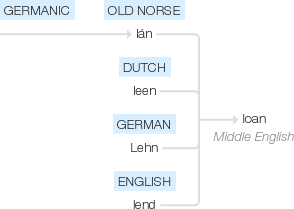Loan
Middle English (also denoting a gift from a superior): from Old Norse lán, of Germanic origin; related to Dutch leen, German Lehn, also to lend.
wiktionary
From Middle English lone, lane, from Old Norse lán, from Proto-Germanic *laihną, from Proto-Indo-European *leykʷ-(“to leave (over)”).
Cognate with Icelandic lán, Swedish lån, Danish lån, German Lehen(“fief”), Dutch leen(“fief”), West Frisian lien, North Frisian leen(“fief; loan; office”), Scots lane, lain, len, Old English lǣn. More at lend.
See lawn.
etymonline
loan (n.)
late 12c., "that which is lent or owning, a thing furnished on promise of future return," also "a gift or reward from a superior, a gift of God," from Old Norse lan "loan," from Proto-Germanic *laikhwniz (source also of Old Frisian len "thing lent," Middle Dutch lene, Dutch leen "loan, fief," Old High German lehan, German Lehn "fief, feudal tenure"), originally "to let have, to leave (to someone)," from PIE *loikw-nes-, suffixed form of root *leikw- "to leave."
The Norse word also is cognate with Old English læn "gift," which according to OED did not survive into Middle English, but its derived verb lænan is the source of lend (v.). From early 15c. as "a contribution to public finances" (ostensibly voluntary but often coerced; sometimes repaid, sometimes not). As a verb, loan is attested from 1540s, perhaps earlier, and formerly was current, but it has now been supplanted in England by lend, though it survives in American English. Slang loan shark first attested 1900 (see shark (n.)).
